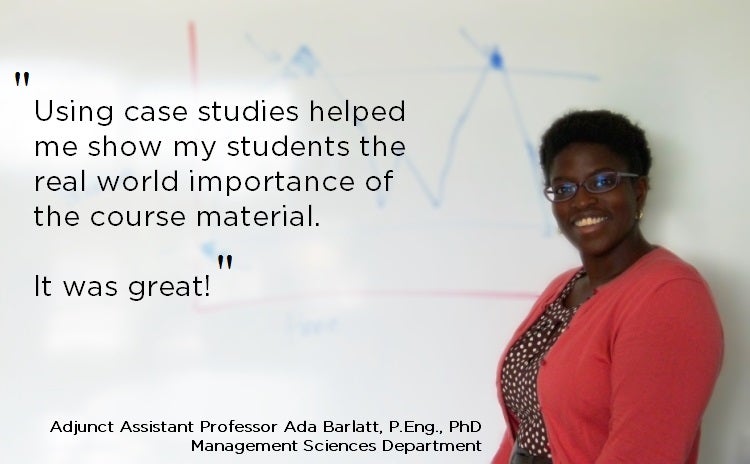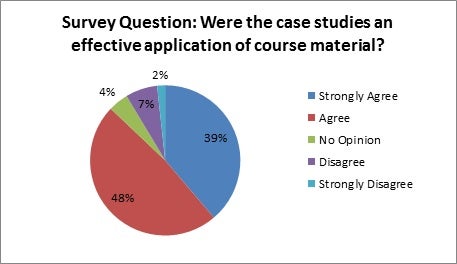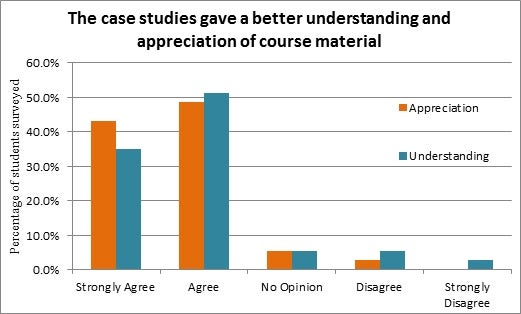
Quality Management and Control (MSCI 551) is a technical elective course that focuses on analysis, evaluation and improvement of designs as well as processes in order to increase quality.
Course Outline
First half of course: Lecture style and theory
Second half of course: Case based learning
During the Spring 2014 term, students were introduced to quantitative methods and fundamental concepts in the first 5 weeks by traditional lecture style and then, throughout the remainder of the term, learned new qualitative techniques and applied all methods and concepts to case studies.
The concepts in MSCI 551 are a mix of quantitative and qualitative methods. I thought that my students would retain more of the information by applying both types of methods to the real world context of case studies.
- Ada Barlatt, Adjunct Assistant Professor
Case Selection
Case 1: Maple Leaf Listeriosis Outbreak
Case 2: SteriPro Optimization
Case 3: Sleeman Gearbox Analysis
Multiple cases were reviewed and the three cases listed above were chosen based on the instructor’s evaluation of the cases’ connection to course objectives. These cases were already developed by WCDE and therefore the focus of each case did not completely fit MSCI 551. To correct this, the instructor then outlined a new problem statement that was more specific to the course material and a WCDE staff member used this to create an additional case assignment that was added to the case study database as a resource for other instructors.

Implementation Strategy
The following implementation strategy was applied to all three case studies used in MSCI 551.
I wanted to teach the students the course concepts through real world examples and provide an engaging and interactive learning environment - bringing case studies into the course was the perfect fit!
- Ada Barlatt, Adjunt Assistant Professor
| Step | Description | Students' Reaction | Instructor's Comments |
|---|---|---|---|
| 1 | Individually read case study and reflect on problem statement |
“It was much better than reading concepts out of the book.” - Anonymous Student |
They need to read on their own in order to contribute to group discussions. |
| 2 | Small comprehension quiz | This was important to motivate students to individually read each case study. | |
| 3 | Small group discussions on suggested solutions (no group goal of reaching consensus) |
“It was easier to see other's perspectives of the cases which ultimately sparked new ideas.” - Anonymous Student |
This step was helpful since they could bounce ideas off each other and also clarify information. |
| 4 | Large group discussion (mediated by instructor) |
“The class discussions were the best. It was an open discussion and it let everyone bounce ideas off each other and not only the prof talking.” - Anonymous Student |
Discussing cases created a more fun and engaging classroom environment than a traditional lecture. |
| 5 | Small group presentations on proposed solution | These were always very interesting to hear! | |
| 6 | Feedback on solution by instructor and peers | This step was just to make sure the students were on track for their report. | |
| 7 | Formal report on case solution |
“The case studies in this course gave me a better understanding of course material because I needed to incorporate course concepts for the quizzes and reports.” -Anonymous Student |
I enjoyed seeing how the students learned the theoretical material by applying it to the cases. |
Industry Representatives
Ark Skupien and Melanie Pastorius from Sleeman Breweries, Guelph, provided a lot of support on the Sleeman Gearbox case study. WCDE requested additional information that was not in the original case study in order to give MSCI 551 students enough material to answer a new problem statement on quality control. Ark and Melanie were able to take the time to visit the students and listen to presentations and also offer insight on the industry perspective.

Student Response
The overall response from the students was very positive. There were numerous comments in the surveys that students enjoyed real life applications and the instructor’s use of the case method.
The use of case studies was waaaaaaaay better than just lectures and projects!
- Anonymous Student
The cases were very interesting and showed how concepts learned in MSCI 551 can be related to real life.
- Anonymous Student

Thank You
I was so pleased to discover WCDE! They enthusiastically answered all of my questions and assisted me in the development and implementation of my course.
- Ada Barlatt, Adjunct Assistant Professor